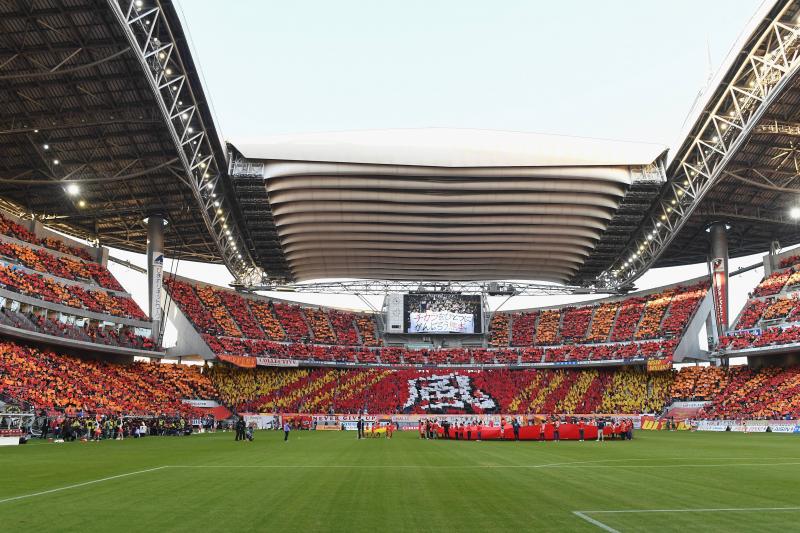
Six points collected from two matches. It’s the best start to Nagoya Grampus’ season since 2007, one that has found them atop the 2018 J1 League table. Of course, it is still early to discuss title aspirations, but a big club should not aim for anything less than that. That’s even more true in an unpredictable league where teams promoted from the J2 can often be found punching above their weight in the J1. The two other clubs with perfect starts, Sanfrecce Hiroshima and Vegalta Sendai, are far from being considered favourites either.
On the J1’s opening weekend, Nagoya travelled to Panasonic Stadium Suita and beat a rebuilding Gamba Osaka 3-2 in a close contest. Last Saturday, in their home opener, Grampus overcame 2017’s sixth-placed finishers with a slim 1-0 Tokai Derby win over Jubilo Iwata. It was a rare scoreline for a Nagoya match which might not have occurred without good performances from both goalkeepers and wasted chances by the two sides.
Yahiro Kazama’s men had five clear scoring chances in the first half. They could only seize one when last year’s strongest defence committed a mistake. Musaev’s clearance attempt hit Shohei Takahashi and the rebound fell to Gabriel Xavier, who had only the keeper in front of him. The number 10 opened the scoring with just eight minutes played, which motivated the home side even more.
As there is no such thing as “holding the result” in Kazama’s style, Jo and company kept attacking the Jubilo and could have settled the result before half time. Jubilo missed goalkeeper Krzysztof Kaminski, but Ryuki Miura, a former fourth-choice keeper, shone on his J1 debut with a few difficult interventions, including a one-on-one save that prevented Jo from extending the lead in the 44th minute.
In the second half, Nagoya’s momentum dropped and Jubilo created one chance after another. They took advantage of a Grampus weakness that Gamba had already exploited in the previous round: the long ball behind the defence. Grampus play an advanced defensive line, which especially allows space in counters. A good passer knows how to benefit from that space: not only Shunsuke Nakamura, but Brazilian newcomer Guilherme Santos and ex-Nagoya man Taishi Taguchi produced scoring opportunities and made use of long passes.
Iwata had four great chances to equalise: Two with Kengo Kawamata, one with Musaev, and another with Adailton. However, Socceroo goalkeeper Mitchell Langerak was inspired, saving his team by blocking everything that came his direction. It took a great deal of luck for Grampus to escape with a clean sheet, and this imbalance between offense and defence is exactly what could hinder their title or AFC Champions League qualification hopes.
The defence invites too many difficult situations and one cannot rest on hopes that that the ball will simply keep refusing to go in, or that the forwards will always work it out up front. Consadole Sapporo manager Mihailo Petrovic also employs this ultra-attacking philosophy, and we saw last year with Urawa Reds how it can go wrong. A team that scores a lot also concedes a lot and comes short in decisive moments. It ultimately cost the Serbian manager his job at a club that months later won the ACL.
Jo and Gabriel Xavier have everything needed to become the most feared foreign duo in the J.League. Together with the skilled Ryota Aoki, a talent who with continued development could become national team material soon, Grampus boast an offensive trident that is second to none in Japan. The defence improved individually with the signings of Langerak and Willian Rocha, not to mention 17-year-old Yukinari Sugawara, who has become a top team starter even before being officially promoted from the academy side. He continues to astonish by showing tremendous maturity on the pitch, and his performance against Iwata was almost impeccable.
Equilibrium is the key, and last season it was Kawasaki Frontale who learned from this same situation to win their first-ever J1 title. There is no doubt that Nagoya Grampus will be one of the most attractive teams to watch in Japan this year. But for the Toyota Stadium residents to take a further step and fight for something meaningful, Kazama needs to find a balance.
Tiago Bontempo is a Brazilian journalist specializing in Japanese football for Globo. He can be found on Twitter at @GunnerTNB

